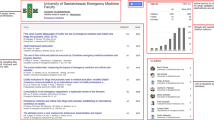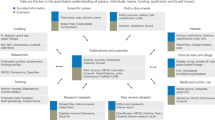Abstract
We have been generously provided an opportunity to write a rejoinder to Jensen and Lister’s chapter published in this volume. From the outset, we want to make it clear that we consider such dialogue healthy and constructive for the field. We appreciate the opportunity to clarify the points made by Jensen and Lister and thank this book’s editors for the opportunity to do so.
This article is reprinted with permission from Wiley & Sons as a rejoinder to Chap. 12. Reference for the original article is as follows:
Falk, J. H., & Needham, M. D. (2016). Utilizing indicator-based methods: ‘Measuring the impact of a science center on its community’. Journal of Research in Science Teaching, 53(1), 65–69.
Access this chapter
Tax calculation will be finalised at checkout
Purchases are for personal use only
Similar content being viewed by others
References
Barron, B. (2006). Interest and self-sustained learning as catalysts of development: A learning ecology perspective. Human Development, 49, 153–224.
Cohen, J. (1988). Statistical power analysis for the behavioral sciences. Hillsdale, NJ: Erlbaum.
Falk, J. H., & Amin, R. (1999). California Science Center: BodyWorks summative evaluation. Technical Report. Annapolis, MD: Institute for Learning Innovation.
Falk, J. H., & Needham, M. D. (2011). Measuring the impact of a science center on its community. Journal of Research in Science Teaching, 48, 1–12.
Falk, J. H., & Storksdieck, M. (2010). Science learning in a leisure setting. Journal of Research in Science Teaching, 47(2), 194–212.
Falk, J. H., Dierking, L. D., Swanger, L., Staus, N., Back, M., Barriault, C., … Verheyden, P. (in press). Role of science centers in supporting adult science literacy: An international, cross-institutional study. Science Education.
Friedman, A. (Ed.). (2008). Framework for evaluating impacts of informal science education projects. Technical Report. Arlington, VA: National Science Foundation.
Groves, R. (1989). Survey costs and survey errors. New York: Wiley.
Ito, M., Baumer, S., Bittanti, M., Boyd, D., Cody, R., Herr-Stephenson, B., et al. (2013). Hanging out, messing around, and geeking out: Kids living and learning with new media. Cambridge, MA: MIT Press.
Jensen, E., & Lister, T. J. P. (2015). Evaluating indicator-based methods of ‘Measuring long-term impacts of a science center on its community’. Journal of Research in Science Teaching, this issue.
Lavrakas, P. J. (Ed.). (2008). Encyclopedia of survey research methods. Thousand Oaks, CA: Sage.
Leinhardt, G., Crowley, K., & Knutson, K. (2002). Learning conversations in museums. Mahwah, NJ: Lawrence Erlbaum.
Lemke, J. L., Lecusay, R., Cole, M., & Michalchik, V. (2012). Documenting and assessing learning in informal and media-rich environments. Boston, MA: MIT Press.
National Research Council (NRC). (2009). Learning science in informal environments: People, places, and pursuits. Committee on Learning Science in Informal Environments. In: P. Bell, B. Lewenstein, A. Shouse, & M. Feder (Eds). Board on Science Education, Center for Education. Division of Behavioral and Social Sciences and Education. Washington, DC: The National Academies Press.
Organization for Economic Cooperation and Development (OECD). (2012). PISA in Focus 18: Are students more engaged when schools offer extracurricular activities?. Paris: OECD.
Renninger, K. A., & Riley, K. R. (2013). Interest, cognition and case of L- and science. In S. Kreitler (Ed.), Cognition and motivation: Forging an interdisciplinary perspective (pp. 352–382). Cambridge, MA: Cambridge University Press.
Stocklmayer, S. M., Rennie, L. J., & Gilbert, J. K. (2010). The roles of the formal and informal sectors in the provision of effective science education. Studies in Science Education, 46, 1–44.
Taplan, S. (2005). Methodological design issues in longitudinal studies of children and young people in out-of-home care: A literature review. Technical Report. NSW Centre for Parenting & Research. Sydney, Australia: NSW Department of Community Services.
Vaske, J. J. (2008). Survey research and analysis: Applications in parks, recreation and human dimensions. State College, PA: Venture.
Author information
Authors and Affiliations
Corresponding author
Editor information
Editors and Affiliations
Rights and permissions
Copyright information
© 2017 Springer International Publishing AG
About this chapter
Cite this chapter
Falk, J.H., Needham, M.D. (2017). Utilizing Indicator-Based Methods: ‘Measuring the Impact of a Science Center on Its Community’. In: Patrick, P. (eds) Preparing Informal Science Educators. Springer, Cham. https://doi.org/10.1007/978-3-319-50398-1_14
Download citation
DOI: https://doi.org/10.1007/978-3-319-50398-1_14
Published:
Publisher Name: Springer, Cham
Print ISBN: 978-3-319-50396-7
Online ISBN: 978-3-319-50398-1
eBook Packages: EducationEducation (R0)




